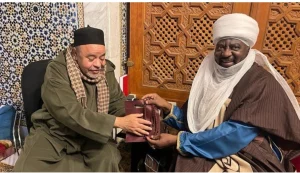
In a significant development within the Tijaniyya Sufi order, the Sarkin Kano, Alhaji Aminu Ado Bayero, was few days ago appointed as a Muƙaddam by Sheikh Zubair Tijjan, the grandson of Sheikh Ahmad Tijjani RTA, the revered founder of the Tijjaniyya. This appointment, which took place during the Emir’s current visit to Morocco, has sparked joy and celebration among supporters and well-wishers of the amiable Emir. Some are already posting status updates congratulating the new “Khalifa” However, it is important nay necessary to clarify that the title of Muƙaddam granted through Ijaza is different from the position of Khalifa within the Tijjaniyya hierarchy.
The Tijjaniyya Sufi order has a structured leadership system that includes various roles serving distinct purposes within the spiritual communion. At the top of this hierarchy is the Sheikh, (Shehi) who is the spiritual guide and leader of a Tijjaniyya branch or community. The Khalifa, on the other hand, is the designated spiritual successor or a vicegerent who is appointed by the Sheikh to assist in leading and guiding the followers of the order. All major Tijjaniyya branches especially in Algeria, Morocco, Senegal and Mauritania all have their independant leadership structure but inter connected in upholding and spreading the teaching of Sheikh Ahmad Tijjani RTA
In the case of the recent appointment of Sarki Aminu Ado Bayero as Muƙaddam, it is important to note that the Muƙaddam is a position that carries responsibilities related to the promotion and propagation of the teachings of the Tijaniyya order and Islam in general. As a Muƙaddam, the Emir is tasked with spreading the spiritual message of the order, fostering unity among the followers, and upholding the principles of the Tijjaniyya tradition. He can equally appoint other local Muƙaddam and Murids. New adherents can receive the Ɗariƙa from him and existing members can renew their allegiance (Tajdidi).
While the Emir’s appointment as Muƙaddam is a significant honour and responsibility, it should be distinguished from the role of Khalifa, which entails broader leadership duties and spiritual authority within the Tijaniyya order. The Muƙaddam plays a vital role in supporting the spiritual mission of the order and assisting the Sheikh in disseminating the teachings to a wider audience.

As we celebrate this momentous occasion and the Emir’s new role as Muƙaddam, let us remember the rich spiritual heritage of the Tijaniyya and the importance of clarity in understanding the various positions and responsibilities within its leadership structure so as to avoid conflict and unnecessary controversy.
Emir Aminu Ado Bayero’s appointment as Muƙaddam signifies a deepening of his commitment to Islam and his dedication to promoting its values especially in his domain of Kano which has been stronghold of the Ɗariƙa for years.
Let us offer our support and best wishes to the Emir as he embarks on this new chapter as a Muƙaddam, continuing the noble legacy of Sheikh Ahmad Tijjani RTA and contributing to the spiritual growth and harmony of the community.
For those of us that are adherents of Tijjaniyya and well wishers of Sarki Aminu Bayero as well, it is crucial that we approach this issue with caution and wisdom, refraining from engaging in conflicts on social media with supporters of other Tijjaniyya leaders despite the inherent provocations.
The Tijjaniyya order has historically maintained a decentralized leadership structure, with independent branches spread across the globe. These branches are united under the legacies and teachings of Sheikh Ahmad Tijjani RTA, emphasizing unity and spiritual growth within the community. To the best of my understanding, Emir Bayero is not in competition with anyone regarding this matter.
In this new role, the Emir is expected to revive his mandate as a religious leader and provide spiritual leadership, promote Islamic values, engage in intersect and interfaith dialogue, and assist both the State and Federal governments in their dealings with Muslim community. His relationship with other regional Tijjaniyya leaders involves promoting unity, cooperation, and collaboration on initiatives that benefit the Muslim and society at large.
It is important to note that Emir Bayero was graciously invited by the King of Morocco, H.M Muhammad Hassan IV, and esteemed Moroccan Ulema, without his stir or any theatrics. This invitation signifies a recognition of Emir Bayero’s spiritual standing and contributions to the religion of Islam. The Moroccan spiritual leaders obviously conferred this responsibility to Sarkin Kano Aminu in recognition of the long standing relationship between Morocco and the Kano ruling house as well as the efforts of his forefathers in promoting Islamic scholarship in bilad al Sudan. We can safely say he is drinking today’s tea with yesterday’s sugar.
I was privileged to be in the Emir’s entourage when he visited Morocco in July 2022 and have seen the amount of love, spirit of oneness and trust exhibited by our hosts especially in Marrakesh and Fez.
It is imperative for those who hold Emir Bayero in esteem to recognize the significance of the Muƙaddamship, understanding that it is not merely a fanciful title, but a solemn responsibility that carries the weight of tradition, heritage, and spiritual legacy. The sanctity of this position should not be trivialized or reduced to fodder for frivolous discourse and discord among pundits on the platform of social media.
Emir Bayero, in his capacity as Muƙaddam, is called upon to embody the core values and teachings of Islam with dedication and double vigor. This new role is a reminder that his mandate extends beyond the confines of traditional practices; it encompasses the dissemination of profound spiritual teaching, the fostering of unity and tolerance, and the cultivation of a deep sense of communal belonging among the Muslim ummah.
As he navigate through the intricate landscape of spiritual leadership, I urged supporters of the Emir to refrain from entangling themselves in the petty conflicts and polemics that may arise on media platforms. Instead, let us be encouraged to uphold the principles of dignity, decorum, and restraint, setting a dignified example for others to emulate in their interactions and engagements within the digital sphere.
In the same vain, Emir Bayero’s interactions with his counterparts, the regional Tijjaniyya leaders, Qadiriyya and Ahlul-Sunnah in Nigeria, should be characterized by a spirit of unity, collaboration, and mutual respect. Together, they form a collective tapestry of spiritual leadership, each thread contributing to the vibrant mosaic of the Islamic tradition in the country. By fostering harmonious relationships and working in concert towards common goals, they can amplify the impact and reach of the Islamic religion in general.
The fact must not be overlooked that Sarkin Kano Aminu, by virtue of his position, is already a Khalifa of Sheikh Usman bin Fodio TagamadahulLah bi rahmatuhi. He also holds the esteemed positions of Khalifa of Sheikh Ibrahim Dabo and the quintessential Ado Bayero. He is undoubtedly a man favoured by both history and destiny in all ramification. The Muƙaddamship from Morocco is truly the icing on the cake of his illustrious achievements. Moreover, on a scale of fair assessment Emir Bayero shines like the radiant moon, embodying the wisdom of Jalaluddeen Rumi, the depth of Ibn Arabi, the introspection of Hujjatul Islam Al-Ghazali, the devotion of Rabia Basri, and the transformative influence of Shams Tabrizi. May the spirits of these pious sufis continue to inspire and guide Emir Bayero on his noble path.
Emir Bayero’s journey as a Muƙaddam is not just a personal odyssey or ego trip no; it is a sacred pilgrimage towards the illumination of hearts, the nurturing of souls, and the enrichment of the spiritual fabric of society. May he tread this path with his known trade marks: grace, respect, integrity, humility, reverence, perseverance, and extreme patience.
* Malam Magaji Galadima Abdullahi holds the title of Magayaƙin Kano
